PREVIOUS
Manmohan Singh
December 29 , 2024
15 days
499
0
Manmohan Singh
(இதன் தமிழ் வடிவத்திற்கு இங்கே சொடுக்கவும்)
Introduction
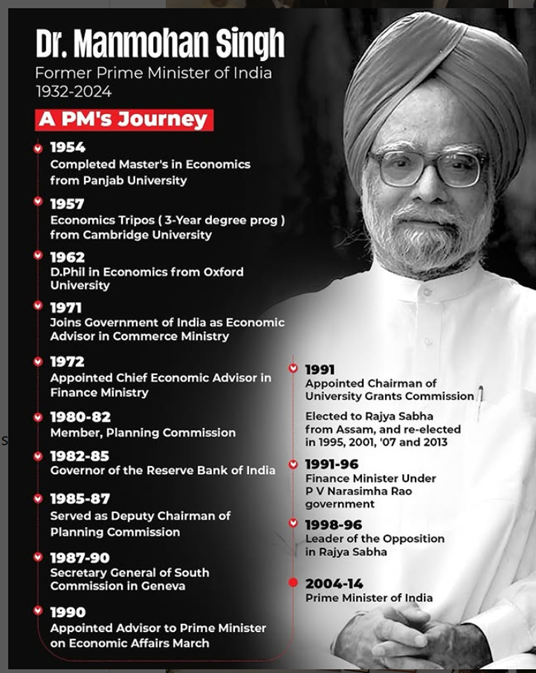
- Manmohan Singh is an Indian economist, politician, and a former Prime Minister of India.
- He served as the 13th Prime Minister from 2004 to 2014, making him one of the longest-serving leaders in India's history.
- Manmohan Singh is widely regarded as an influential figure in India's economic reforms, particularly for his role in liberalizing the Indian economy in the 1990s.
Early Life and Education
- Born on 26 September 1932 in Gah, Punjab (now in Pakistan).
- His family migrated to India during Partition in 1947.
- He attended early schooling in Urdu medium, then in Peshawar (now in Pakistan).
- He moved to Haldwani and later Amritsar in the post-Partition period.
- He studied at Hindu College, Amritsar, and Panjab University, earning his bachelor’s and master’s degrees in Economics (1952, 1954).
- He completed his Economics at University of Cambridge in 1957, attending St John’s College.
- He earned a DPhil from the University of Oxford in 1962.
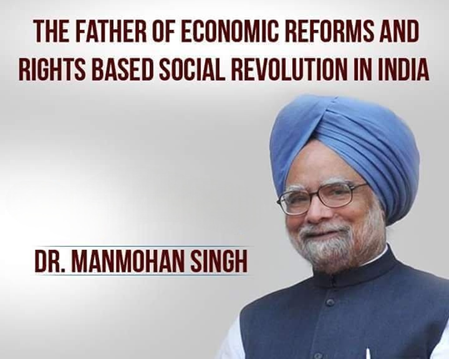
Personal Life
- He came from a family of Punjabi Sikh traders.
- He was raised by his grandmother, Jamna Devi, after his mother's early death.
- He is Known for his deep academic background and strong commitment to economic reforms.
Early Career
- Senior Lecturer at Panjab University: 1957–1959.
- Reader in Economics at Panjab University: 1959–1963.
- Professor of Economics at Panjab University: 1963–1965.
- United Nations Conference on Trade and Development (UNCTAD): Worked from 1966 to 1969.
- Advisor to the Ministry of Foreign Trade: Appointed by Lalit Narayan Mishra in recognition of Singh's expertise as an economist.
- Professor of International Trade at Delhi School of Economics, University of Delhi: 1969–1971.
- Chief Economic Adviser in the Ministry of Finance: 1972–1976.
- Secretary in the Ministry of Finance: 1976.
- Planning Commission: Served in 1980–1982.
- Governor of the Reserve Bank of India: 1982–1985 under Finance Minister Pranab Mukherjee.
- Deputy Chairman of the Planning Commission: 1985–1987.
- Secretary-General of the South Commission: 1987–1990.
- Advisor to Prime Minister Chandra Shekar on Economic Affairs: Post-1990.
- Chairman of the University Grants Commission: 1991.
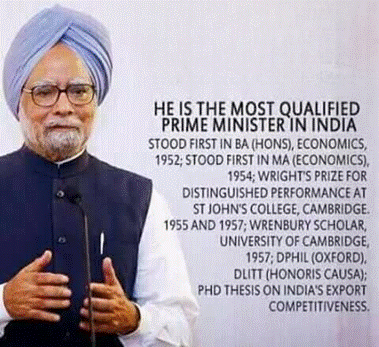
Political Career
Finance Minister (1991–1996)
- India’s Economic Crisis: Faced severe fiscal and balance of payments deficit in 1991.
- Deregulation: Singh eliminated the Permit Raj, also reduced state control, and he initiated economic liberalization.
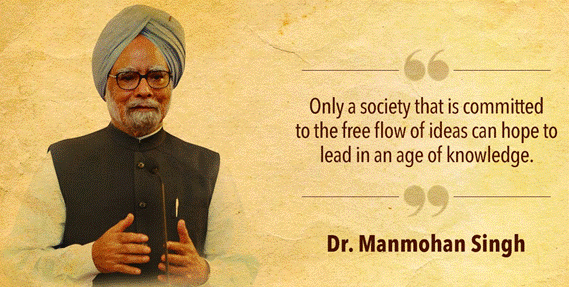
Leader of Opposition (1998–2004)
- Rajya Sabha: Elected in 1991 from Assam, re-elected in 1995, 2001, 2007, and 2013.
- Leader of Opposition in Rajya Sabha: From 1998 to 2004, during the Bharatiya Janata Party (BJP) government.
Prime Minister
First Term (2004–2009)
- 2004 General Election: Indian National Congress (INC) became the largest party; UPA formed government.
- Unexpected Prime Minister Nomination: Sonia Gandhi nominated Singh as Prime Minister despite his lack of direct electoral victory.
- He took oath on 22 May 2004.
- He co-founded BRICS in 2009.
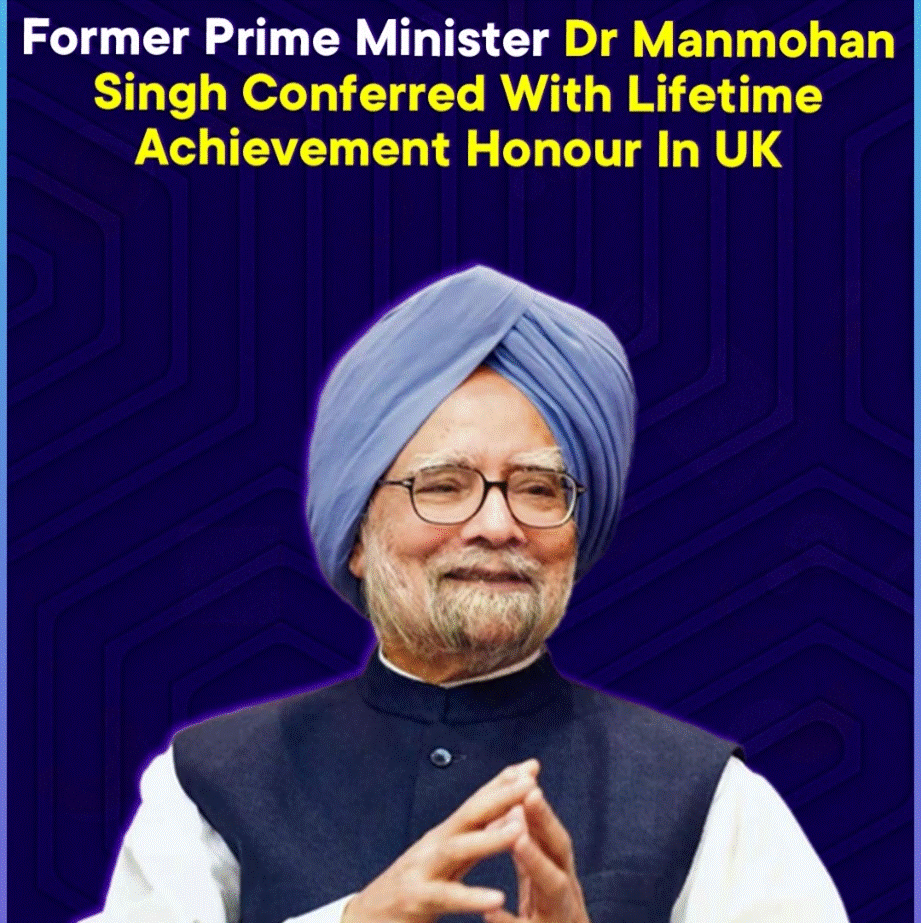
Economic Policy
- Liberalization Continuation: He continued to promote the economic growth and reforms initiated in 1991.
- High Economic Growth: Under Singh’s leadership, India experienced 8–9% annual GDP growth; 2007 saw 9% growth.
- National Employment Guarantee Act (MGNREGA): Introduced in 2005 to provide employment and reduce poverty.
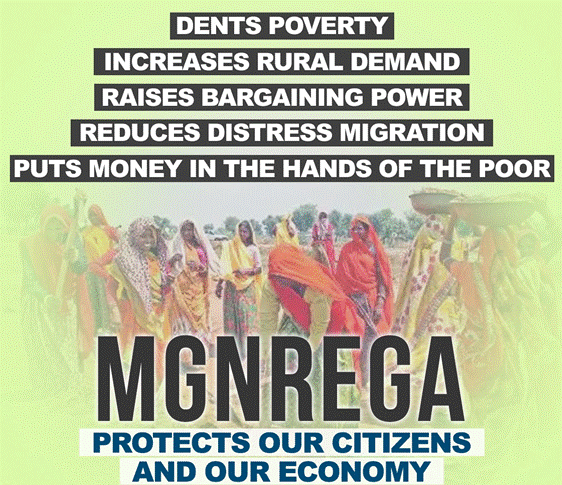
- Value Added Tax (VAT): Introduced in 2005, replacing sales tax.
- Inflation Management: Addressed the global inflationary pressures in 2007–2008.
Healthcare and Education
- Opening of IITs: Eight new Indian Institutes of Technology (IITs) were opened across various states, including Andhra Pradesh, Bihar, and Gujarat.
- Sarva Shiksha Abhiyan: Continued under Singh's government, improving access to education in rural areas, along with the introduction of mid-day meals in schools to fight illiteracy.
Security and Home Affairs
- Anti-Terror Laws: Strengthened with amendments to the Unlawful Activities (Prevention) Act (UAPA) and the creation of the National Investigation Agency (NIA) following the 2008 Mumbai terror attacks.
- Unique Identification Authority of India (UIDAI): Established in February 2009.
- To implement a Multipurpose National Identity Card aimed at enhancing national security and enabling e-governance.
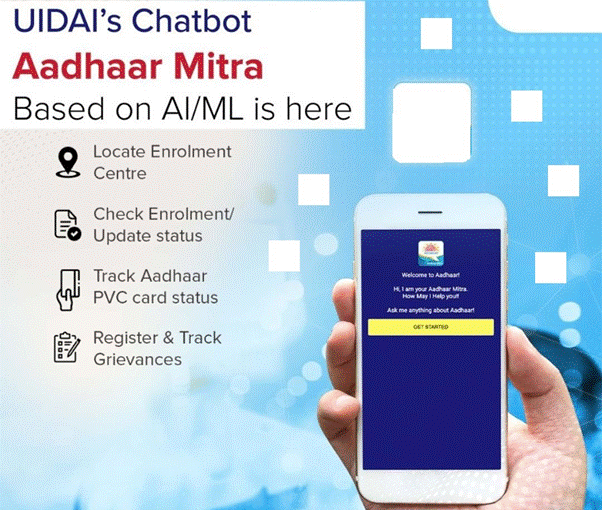
- Kashmir Reconstruction: Singh's government has initiated reconstruction efforts in Kashmir, although insurgent infiltration and terrorism rose after 2009.
- However, terrorism in Northeast India was significantly reduced during his tenure.
Notable Legislations
- Cash Benefits for Vulnerable Groups: Introduced new cash benefits for widows, pregnant women, and landless persons.
- Right to Fair Compensation and Transparency in Land Acquisition, Rehabilitation and Resettlement Act (2013) enacted to improve the process of land acquisition and ensure fair compensation.
Foreign Policy
- Sino-Indian Relations: Singh pursued efforts to resolve the border disputes with China, including a historic visit by Chinese President Hu Jintao to India in 2006 and the reopening of the Nathula Pass after 40 years in the same year.
- Indo-US Relations: Improved during Singh's tenure, highlighted by the Indo-US civilian nuclear agreement signed in 2008.
- Singh visited the U.S. in 2005, and in 2009 became the first Indian Prime Minister to make a state visit to the White House under President Barack Obama.
Second Term: 2009–2014
- India held the 2009 general elections in April-May, resulting in a UPA victory.
- Manmohan Singh became the first prime minister since Nehru in 1962 to win re-election after completing a full term.
- The UPA secured a majority with 322 out of 543 members, with support from various regional parties.
- Singh was sworn in as prime minister on 22 May 2009.
Post-Premiership (2014–2024)
- Singh’s premiership ended on 17 May 2014 after the BJP-led NDA won the election.
- He did not contest the 2014 elections as a prime ministerial candidate and served as acting prime minister until 26 May 2014.
- He retired from the Rajya Sabha in April 2024, succeeded by Sonia Gandhi.
Key Initiatives Under Manmohan Singh’s Leadership
First Term (2004-2009)
- National Rural Health Mission (NHRM): Launched in 2005 to improve rural healthcare, mobilizing over half a million community health workers.
- Reservation in Education: In 2006, the government implemented a proposal to reserve 27% of seats in institutions like AIIMS, IITs, IIMs, and other central universities for Other Backward Classes (OBCs), leading to the 2006 Indian anti-reservation protests.
- Right to Education (RTE) Act (2009): Introduced to make education a fundamental right for children aged 6–14, implemented in 2010.
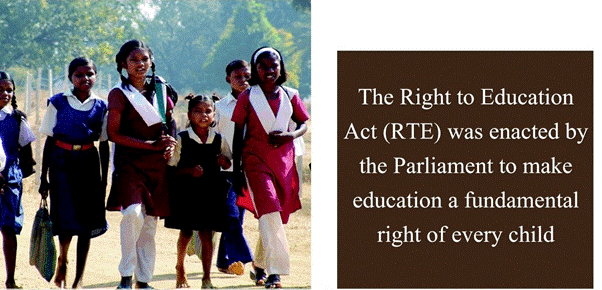
- This made India one of the 135 countries to guarantee education as a fundamental right.
- Direct Benefit Transfers (DBT)
- Initiated to transfer subsidies directly into beneficiaries’ bank accounts, minimizing leakages and ensuring targeted welfare delivery.
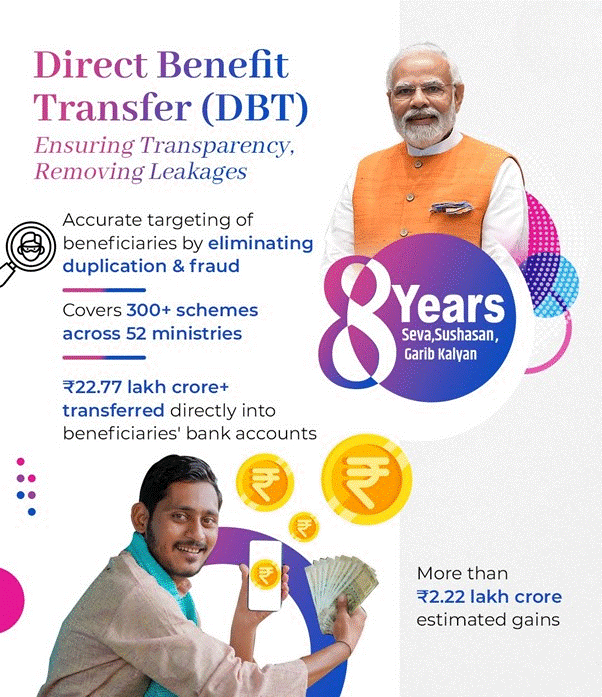
Second Term (2009-2014)
- Economic Growth
- India’s economy maintained strong growth during Singh's second term, with GDP growth reaching around 9% annually.
- National Food Security Act
- Implemented in 2013, this act has provided food grains to two-thirds of India’s population, addressing hunger and malnutrition.
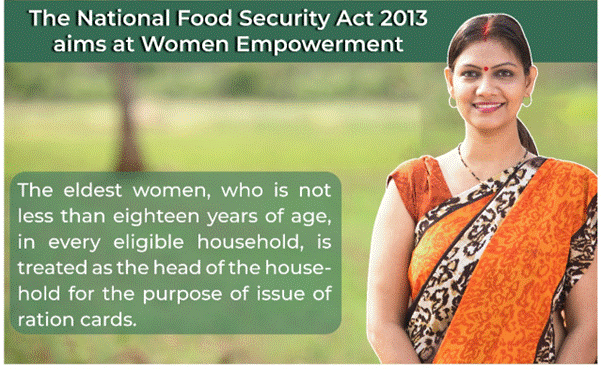
- Aadhaar Project
- Aimed at providing a unique identification number to all residents of India, facilitating access to services and promoting transparency in government welfare schemes.
Literary Contribution
- He authored India’s Export Trends and Prospects for Self-Sustained Growth, a significant work in economic literature.
Awards and Recognition
- Padma Vibhushan (1987): India's second-highest civilian honor.
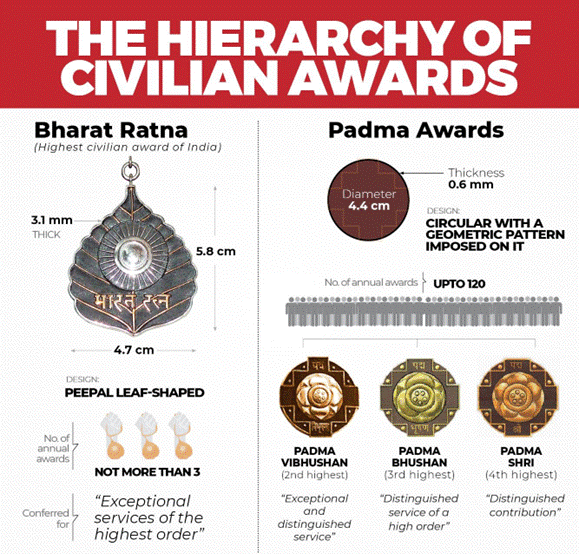
- Jawaharlal Nehru Birth Centenary Award (1995): For contributions to science and economics.
- Asia Money Finance Minister of the Year (1993, 1994) and Euro Money Finance Minister of the Year (1993).
- Adam Smith Prize (1956): Prestigious recognition for academic excellence at the University of Cambridge.
- Wright’s Prize (1955): Awarded for distinguished performance at St. John’s College, Cambridge.
- Honorary Degrees: Conferred by the prestigious institutions like Cambridge and Oxford Universities.
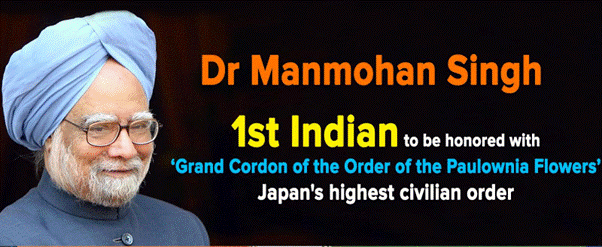
Later Years
- He served in the Rajya Sabha from Assam (1991–2019) and Rajasthan (2019–2024).
- Dr. Manmohan Singh, the 13th Prime Minister of India, passed away on December 26, 2024, at the age of 92 in Delhi.
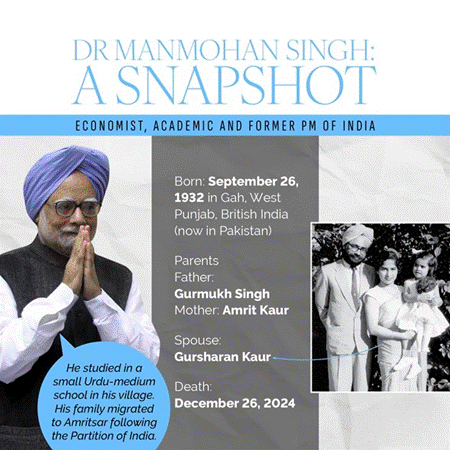
-------------------------------------
Leave a Reply
Your Comment is awaiting moderation.


